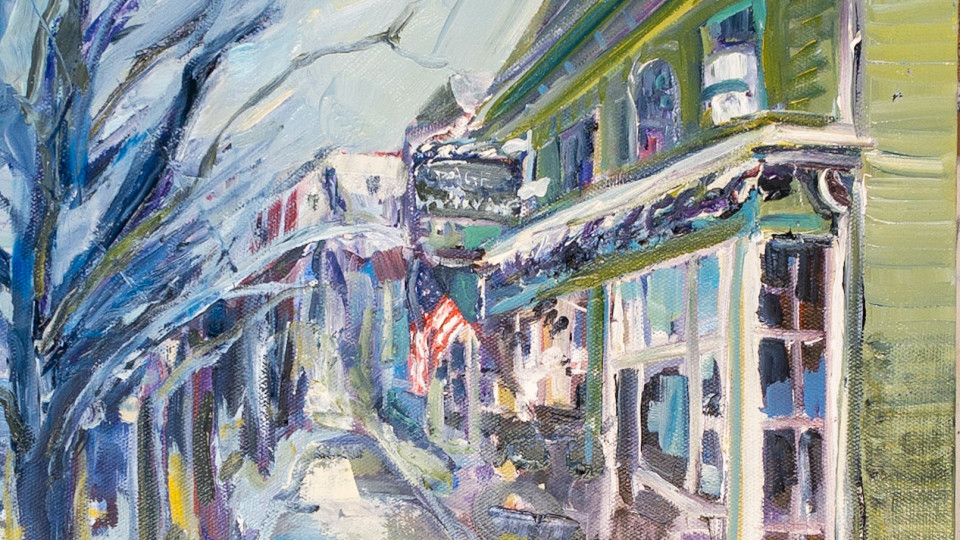Many of you know I have made several moves over the past decade. Moving is a process most of us go through a few times in life, and if you are like me, one of the first things to gauge in the selection process is the town's character. While this seems simple in smaller cities, the same evaluation occurs in metropolitan cities, except the "town" becomes a "neighborhood." Why is this important? Because so much about a way of life reflects in the shops operating on the local streets. While recently visiting Key West, I stopped into the art museum and saw the works of Cuban artist Mario Sanchez (1908-2005). Mario's work depicts street vendors selling on the streets of Key West. In the curated exhibition, wall signage reads: "Each generation should tell the next about its ancestors." The quote had me thinking of the many functions of art. At its core is the role of communicating. Like Mario, I noticed that I, too, frequently include themes of everyday scenes in my works and wonder how they might be interpreted or read in future times. I enjoy the street for its constant state of change. Like a fresh-picked flower, street energy is ephemeral. Like good design, the differences draw me into location. Painting is an attempt to understand. To absorb my place at the moment occurring now.
INSIGHT TO THE DISAPPEARING MAIN STREET
Main Street shopping has been under threat from big businesses for a while now. This is happening in both small towns and urban neighborhoods. In the book "Store Front II: A History Preserved, the Disappearing Face of New York," James and Karla Murray, native New Yorkers living in the East Village, took on the role of documenting the vanishing mom-and-pop shops of NYC. Once staples define a town's fabric and character, the shops are slowly relegated to history.
"Many neighborhood stores had closed. The whole look and feel of the neighborhood had changed, and much of its individuality and charm had gone," said Murray. Similarly, small-town like the one described by Art Miller in the Door County Pulse, Door County Wisconson, https://doorcountypulse.com/this-old-store-rural-groceries-were-once-centers-of-small-town-life/ describes the vanishing of the country grocery store Washickeck (1909-1998) as The Piggly Wiggly replaced it in 1983. "The stores served as community centers as well: repositories of news and places to find camaraderie." states the article. Miller goes on to say, "People felt a connection to their store. Even if a small town had two or three, families usually shopped exclusively at one of them. Many of the grocers were available in emergencies, day or, night because it was common for their families to live behind or over the shops." What was lost was not just a store but a way of life.
My featured painting for the month of March looks at street scenes in small-town Guilford, Connecticut but as the month progresses, I will add a neighborhood scene at the bottom depicting an urban area in the lower East Village. The title "9 Boston Street" refers to the exact location of the particular scene I captured last December with the freshly fallen snow gathering on the sidewalk. I grew up in a rural town in Michigan, and ever since I was young, I found independent hardware stores places of wonder. Reminiscently smelling like my grandfather's farm office, I frequented them regularly in my youth, observing grizzled men who make and fix stuff. The shelves are full of flashlights, hatchets, balsa-wood airplanes, bins loaded with bolts, springs, magnets, and popcorn machines that benefit the Lions Club. They even carry cooking gadgets and locally made candles for unique gift items. For years, the old-fashioned hardware store has seen its numbers dwindle. Home centers, big-box companies, and bumpy economies are the culprit. But honestly, nothing beats a family-owned operation where dogs are welcome, familiar faces greet you, questions are answered. You don't need a screen to catch up on local news. The owner can tell you invaluable knowledge such as which trowel is for skim coating, which screwdriver has lasted him the most decades, and why you need a hammer drill to attach your porch light to the brick. Pages Hardware, in Guilford, has been open for business for over 80 years. Opening in 1939, it's more than just a family-owned business on a small-town street corner. It is a functional symbol of the past era where small family-owned businesses were the lifeline to rural America. To clarify, Page's Hardware is not in a position of imminent closure, nor do I ever hope it to be the case. I love shopping there. I am suggesting, however, that in life, plot twists happen. Society evolves. It is okay to look at the past and embrace the future all at the same time.
The past is not necessarily a place of longing and desire, but rather of understanding and celebration: a way of looking at the world from a different point of view and providing a place to leap from. When I look at the work of Mario, I see similarities in my own quest. Art does inform; it can also influence society by changing opinions, instilling values, and translating experiences across space and time. Research has shown art affects the fundamental sense of self. Painting, sculpture, music, literature, and the other arts are often considered the repository of a society's collective memory. When you support the arts, you become a co-create in those values and ideas.

